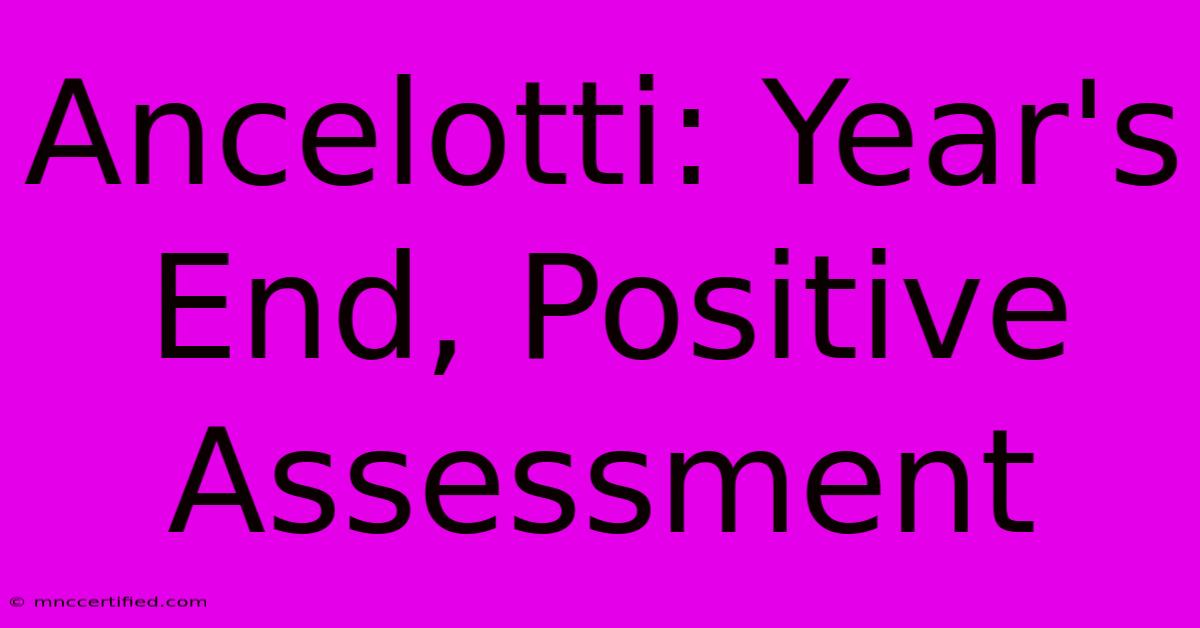Ancelotti: Year's End, Positive Assessment

Table of Contents
Ancelotti: Year's End, Positive Assessment
Carlo Ancelotti's managerial career is a tapestry woven with success, and as the year draws to a close, another thread of achievement is added to its rich design. This article will delve into the reasons why 2023 has been a largely positive year for the Italian tactician, examining his accomplishments and addressing any minor shortcomings.
A Year of Triumphs: Real Madrid's Continued Success and Beyond
Ancelotti's impact on Real Madrid continues to be undeniable. While the year may not have yielded the Champions League trophy, the team consistently demonstrated the hallmarks of his tactical prowess: controlled possession, clinical finishing, and a resilient defense. The strategic adjustments he made throughout the season, adapting to different opponents and playing styles, showcased his masterful understanding of the game. This adaptability is a key factor in his enduring success.
La Liga Dominance: A Testament to Strategic Depth
Real Madrid's strong showing in La Liga this year is a clear testament to Ancelotti's ability to cultivate a winning team culture. His management style, known for its blend of discipline and encouragement, has fostered a strong team spirit, crucial for maintaining consistent performance throughout a long and demanding season. The team's ability to overcome setbacks and maintain a high level of play reflects the effectiveness of his leadership.
Beyond Madrid: A Global Perspective
Ancelotti's influence extends beyond Real Madrid. His reputation as one of the world's foremost managers continues to grow, attracting attention from clubs and analysts alike. His tactical philosophy, characterized by its fluidity and adaptability, remains a source of study and inspiration for aspiring coaches worldwide. This global recognition is a crucial factor in his overall success and continued influence in the football world.
Addressing Minor Setbacks: Room for Improvement?
While the year has been largely positive, no manager is without room for improvement. Despite strong performances, Real Madrid experienced some setbacks, particularly in crucial Champions League matches. Analyzing these instances reveals opportunities for refining strategy and player development. This self-awareness is a characteristic often found in the most successful managers.
The Importance of Squad Rotation: Managing Fatigue and Form
One area for potential improvement could be squad rotation. Managing player fatigue and maintaining peak form throughout a long season requires careful planning and execution. By utilizing his squad's depth effectively, Ancelotti could potentially minimize the impact of injuries and ensure consistent performance across all competitions. Strategic squad rotation is a key component of long-term success.
Adapting to Evolving Tactical Landscapes: The Constant Pursuit of Excellence
The football world is constantly evolving, with new tactical approaches emerging regularly. Ancelotti’s continued success depends on his ability to adapt his strategies to counter these evolving trends. Staying ahead of the curve requires a continuous analysis of opponent's tactics and a willingness to experiment with new formations and approaches. This continuous learning and improvement are hallmarks of Ancelotti's management.
Conclusion: A Year of Consolidation and Future Promise
In conclusion, Ancelotti’s year has been largely positive, characterized by strong team performances and a continued demonstration of his managerial expertise. While some areas require ongoing refinement, his overall accomplishments solidify his place as one of the top managers in the world. As the year concludes, Ancelotti's legacy continues to grow, promising exciting possibilities for the future. His dedication to the sport, keen tactical mind, and ability to foster winning team cultures guarantees continued success for years to come. The world of football will undoubtedly be watching closely to see what he accomplishes next.

Thank you for visiting our website wich cover about Ancelotti: Year's End, Positive Assessment. We hope the information provided has been useful to you. Feel free to contact us if you have any questions or need further assistance. See you next time and dont miss to bookmark.
Featured Posts
-
My Honey Factory Hilltop Honey
Dec 24, 2024
-
Saints Vs Packers Monday Night Review
Dec 24, 2024
-
Red Sox Land Buehler Deal
Dec 24, 2024
-
2025 Nfl Draft Packers Pick Remains
Dec 24, 2024
-
Former President Clinton Hospitalized
Dec 24, 2024